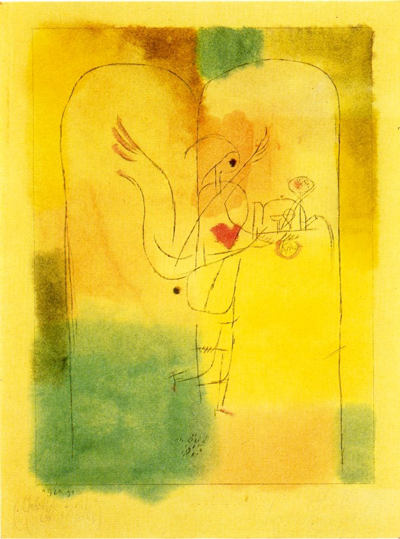
An Angel Serves a Small Breakfast
Paul Klee (German, 1879-1940)
Lithograph with additional watercolors,1920
Metaphysics
For a while after he died
my father didn't seem to
discern dream visitors, but
I was amazed nonetheless
to witness his swift and
serene rejuvenation. From
time to time I'd find him
dining outdoors in beautiful
locales, a multicolored
grain on his plate I'd
never seen elsewhere.
Yes, laughed the server,
It's a staple here; a sort
of national dish, I guess,
like potatoes in Ireland,
pasta in Italy, cous cous
in Morocco, rice in Japan
or Madagascar. We can't
get enough of it, and it's
remarkably nutritious.
What's it's called? I asked.
She replied, metaphysics.
Poetry
November 2015
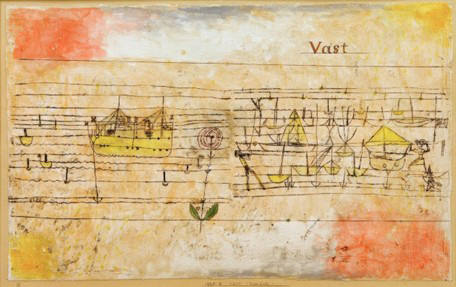
Melody and Rhythms
Paul Klee, German (1879-1940)
Watercolor, 1925
Philosophical Sonata
I was notified in a dream that my solitary studies—of which few knew and nothing much had ever come—had earned me an honorary degree in a little-known branch of philosophy. The degree would be conferred at a nearby university on such-and-such a date. They hoped I could be present .
Arriving at the ceremony on the appointed evening, I found my mother, much to my surprise, already onstage, seated at the piano. She announced that, in lieu of a speech in my honor, she would perform her rendition of a book I loved, a volume that was the heart and soul of my studies. As she began to play, I was amazed that a book, any book, could function as a musical score. But even more astonished that the long, arduous, mysterious opus that had come to mean so much to me—a hundred books in one, a lifetime of grappling—was so lucidly expressed by the wondrous sonata my mother played that night.
After the applause abated, she laughingly told the audience that she’d learned to play the book simply by dying. Whereas for her daughter (and here she gestured toward me), it was a lifelong métier ...
It then hit me that this was the answer I’d been waiting for. Nothing on the order of, say, Martha Argerich performing Rachmaninov at Lugano. No, this would be something else entirely. In taking the stage, I thanked our hosts for organizing this extraordinary occasion—then sat down at the piano and began to play.
The Manhattan Review
Fall/Winter 2022/23
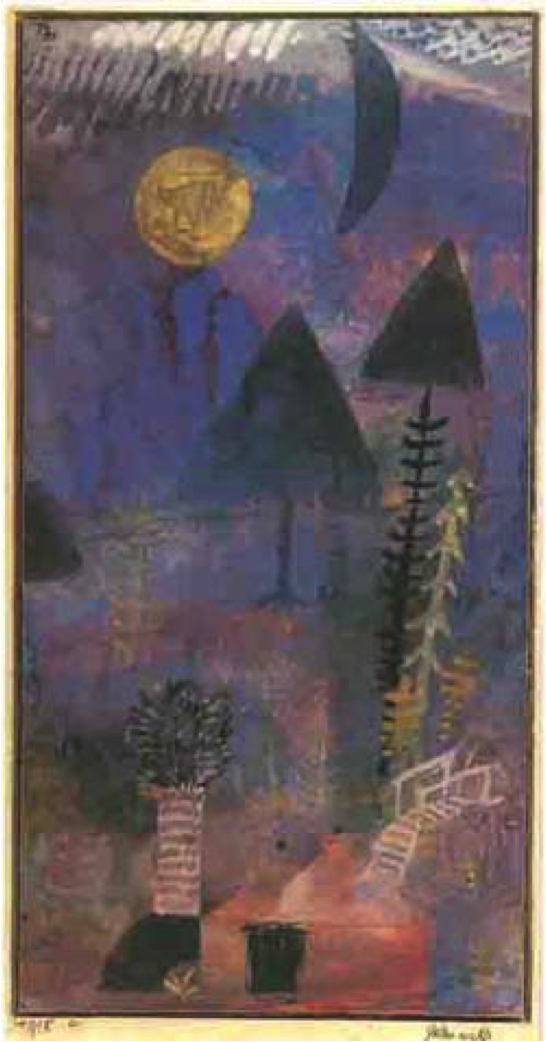
Garden at Night, Moon- and Shadow-Mushrooms,
Paul Klee, German (1879-1940)
Watercolor, 1918
Collection of Ernst Beyeler, Basle
The Search
But then the moon comes
up after all and with a glow bright
enough to wake you through
the bedroom curtains,
the night outside,
room beside which indoor rooms seem to
belong to a preliminary, rudimentary
dimension
and her there shining—
mother daughter friend anima mundi—
so still and low it's almost as though
you hadn't broken every vow you ever
made in the wayside tabernacles of
the night behind the forehead.
Go back to bed,
resolved this time to get all the way
to the other side of the dark, find
a place to set up shop, work without
letup by the light love supplies, rid
at last of mental fuss.
Soon you're
walking down a deserted road through
a nighttime countryside, wondering
if one of the locals is acquainted with
the lesser-known lunar writings.
Houses
are few, everyone's asleep,
the air suffused with a beautiful half-light
whose source you can't place. You're
strangely unafraid and in no hurry.
Included in Best Spiritual Writing 2012
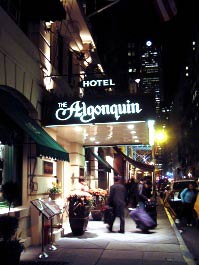
The Algonquin Hotel
Times Square, New York
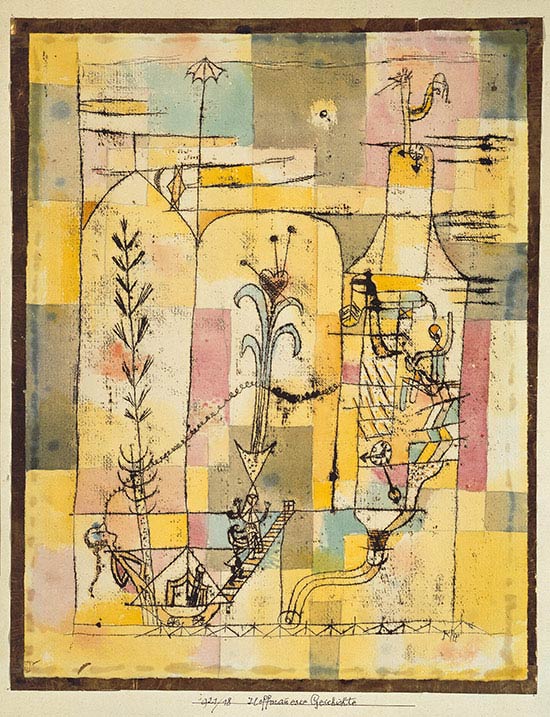
Tale á la Hoffman
Paul Klee, German 1879-1940
Watercolor, pencil and transferred printing ink on paper, 1921
Metropolitan Museum of Art
The Berggruen Klee Collection
Songwriting at the Algonquin
The night Kenneth Koch and I had dinner with Leonard
Cohen at the Algonquin, Leonard seemed less a famous
songwriter than a disconsolate figure from one of his songs—
having just lost, he told us, the great love of his life; all his
own fault. Kenneth had met Leonard before either was anybody
one legendary summer on the island of Hydra; Leonard still
with Marianne, Kenneth with Janice; whereas by the night at
the Algonquin, “So Long Marianne” was a classic; Kenneth
had written his magical second “Circus”—the first of his
poems to tie the paradise of writing to having and losing
Janice—and he and I lived up by Columbia together.
We felt so sorry for Leonard that the talk at dinner kept
circling back to love and loss, and as we philosophized and sympathized, traded stories and poured wine, the idea arose
that the three of us could compose the greatest love song of all
time. A joke, of course, except Leonard wasn’t kidding. He’d
write the music and split three ways the credit and the money—
and what with him staying right there at the Algonquin
up we went to his room after dinner to nail down
the song. Leonard offered hints; I jotted something down,
but Kenneth who’d glimpsed the comic implications, started joking
around about our pending musical celebrity and got us laughing so
hilariously at the sagas we devised for the lovers in the song
that in parting that night, we left for another time the miraculous
lyrics that would lift the world’s spirits—or break its heart.
In fact, decades went by and Kenneth had died before
I saw Leonard in person again—and then from a distant
row of an audience of eighteen thousand or so, at his late-life
concert at Barclays Center. Pretty crass venue; ads circling
and flashing, sound system blasting; I was about to walk out,
then—there he was—singing, miles away on the tiny stage, but
an almost apparitional officiant in the giant close-up monitor;
same grace and humor I remembered; at times, a supplicant
on his knees; the female backup singers like a plural
higher being, singing: If it be your will / to let me sing. . . .
Kenneth would have found the scene wonderfully
funny and intriguing, perhaps warranting ottava rima, as
the softest of hums filled the arena, everywhere and nowhere
like a high-tech trick—but no, the whole place was singing
along under its breath. Every heart / To love will come /
But like a refugee. The songs came and went on the spellbound
lips, as if bridging the rift central to the singer’s surreptitious
metaphysics with the bit of infinitude that sifts back to us by dint
of it; the voice at once of the lovelorn divine and bereft exiles
fleeing, in hopes of finding, one another. Or so it seemed
as the crowd dispersed in the night rain outside
Barclays Center. At the time of our dinner, I sang
my kids to sleep at night with “That’s No Way to Say
Goodbye,” whereas Kenneth sang Italian opera as we made
the toast and coffee—Di quell’amor, quell'amor chè palpito /
Dell’universo, dell’universo intero— before heading to our desks
to resume the endless quest: Kenneth to the exuberant
tat tat of his Olivetti, x-ing out and re-emending the poem
he would read to me that evening. “To Marina,” say, his
multi-temporal meditation on how what’s over is never over
even as it’s always forever gone: Is it snow, Marina, / Is it
snow or light? / Let’s take a walk. The gist of many
a Cohen line—Did I ever leave you? / Was I ever able? /
Are we still leaning / Across the old table? The lemon and
almond trees blossom and wither in lyrics set on the island of
Hydra, addressed to the woman to whom he’d said, So long
in that first hit song—the one he’d write to just before she
died: I’m so close behind, your hand could reach mine.
Left unmentioned at dinner at the Algonquin that
evening, as we pondered the enigmas of love and loss,
was that things between Kenneth and me had already begun
to go wrong; we were ineluctably entering a Leonard
Cohen song. Not a song that he’d already written or would
someday write, but one that might have pierced
the mystery to its heart, had we written it that night.
The Manhattan Review
Fall/Winter 2019-2020